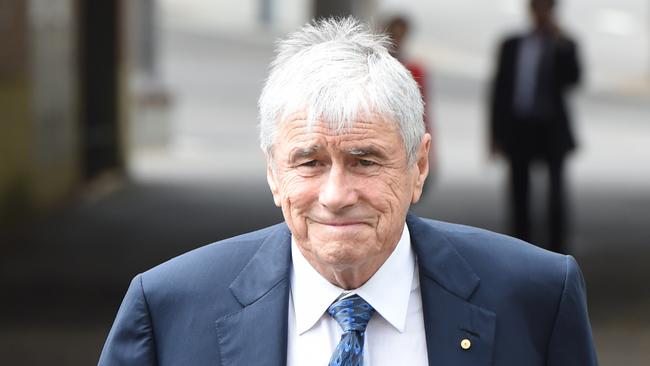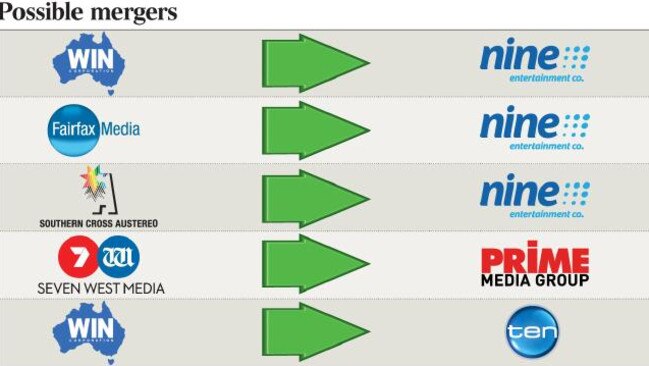Corporate leaders hail breakthrough on media law reform
Corporate chiefs in the $15 billion media industry have enthusiastically endorsed the government’s policy reforms.

Corporate chiefs in the $15 billion media industry have enthusiastically endorsed the Turnbull government’s policy reforms after years of false dawns, amid hopes the changes could spur growth.
After months of torturous negotiations with the crossbenchers, the government yesterday passed sweeping overhauls of media ownership and concentration laws, with Communications and Arts Minister Mitch Fifield succeeding where so many before him had failed.
Major changes include the removal of the two-out-of-three ownership rule and the 75 per cent audience-reach rule that the industry blames for creating an uneven playing field against the likes of Facebook and Google.
A more relaxed set of rules could open the door to deals between newspaper publishers, radio stations and television networks. The Seven, Ten and Nine networks can now merge with regional affiliates as traditional media outlets vie to compete with the digital technology giants.
The bill will have to return to the House of Representatives, which has already adjourned for the week, when parliament resumes on October 16 before it becomes law. The government has a majority in the house so this should be a formality.
Kerry Stokes, chairman of Seven West Media, described the new laws as “historic” and said they would give Australian media companies a “real opportunity to compete with unregulated global players ... That means a better future for local news and Australian stories.”
Michael Miller, executive chairman of News Corp Australasia, publisher of The Australian, said the changes would help “address” the way in which technology and new forms of delivery had fundamentally altered the media landscape, particularly in regional markets.
“These reforms are important. They will better enable the nation’s media operations, particularly in regional areas, to have certainty and invest in local communities and jobs in appropriate ways for a multi-platform digital age.”
Previous efforts to overhaul the sector to account for the rise of the Silicon Valley giants and online streaming services have run aground in the face of rivalries among media players, but a successful push by Senator Fifield attained cross-industry support for the first time.

Greg Hywood, chief executive of Fairfax Media, joined Mr Stokes and other industry leaders in paying tribute to Prime Minister Malcolm Turnbull and Senator Fifield for “bringing media legislation into the modern age”.
“It is no small feat having the sector united on what is the best legislative setting for the future. Fairfax acknowledges that there was broad support by the Senate crossbenchers,” he said, singling out Senator Nick Xenophon for his support.
Amid speculation the repeal of laws originally designed for a pre-internet era could trigger mergers and acquisitions activity, Mr Hywood said: “Fairfax will act in the best interests of shareholders to take advantage of any opportunities created by the changes.”
There are rumours one such dance partner for Fairfax could be Nine Entertainment Co, whose CEO Hugh Marks did little to dispel suggestions of merger and acquisition activity in the wake of the new legislation.
“The changes in ownership laws provide more flexibility to media organisations to configure their businesses in a structure that allows greater efficiencies and flexibility to respond to audiences’ needs,” he said.
Not since 2006 has a federal government made such big changes to the legislative framework in the media industry.
Peter Tonagh, CEO of Foxtel, said: “This package will significantly increase the ability of Australian media companies to compete in an increasingly competitive world.”
Broadcasting licence fees will be abolished and small changes made to the anti-siphoning list.
Ten Network CEO Paul Anderson said he was “relieved at the prospect of saying goodbye to the world’s highest licence fees and the antiquated ownership laws”.
John Hartigan, chairman of Prime Media Group, said: “The commercial viability of Australian-owned media businesses ensures diversity of voices and opinions in the community, particularly in regional Australia.”




To join the conversation, please log in. Don't have an account? Register
Join the conversation, you are commenting as Logout